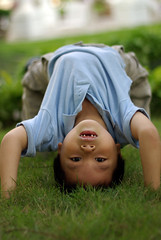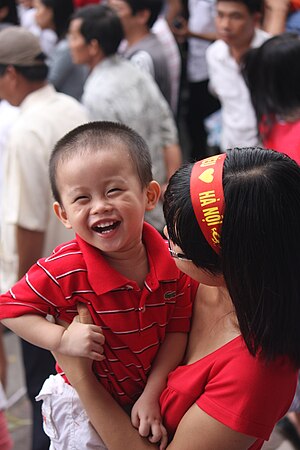| Child 1 (Photo credit: Tony Trần) |
This post continues with The Costs of Workaholism: The Poisoning of Personal Relationships from Chapter Nine.
This series looks at a small snippet of The book on the Perfectionist Personality, aka The Obsessive Compulsive disordered Personality, aka OCPD, each week. Please follow along, leave your comments, engage more on the FaceBook website... whatever your heart calls you to do.
When Being in Control Gets Out of Control by Allan E. Mallinger, M.D. and Jeanette DeWyze was published by Random House in 1992. If you believe you are dealing with OCPD or someone who is "Too Perfect," whether that's you or a loved one, please buy a copy of the book and read it for additional insights that will not all be covered in these excerpts.
The Costs of Workaholism
All these [the previous posts] are very real benefits - but they're benefits of work rather than of workaholism, and they all can be enjoyed even if work plays a more balanced role in your life. <snip>
THE POISONING OF PERSONAL RELATIONSHIPS
Shortchanged Children
If you do have children, you're likely to tell yourself that you're working as hard as you are for their sake - a sacrifice they may find of questionable value. In their book The Addictive Organization, Anne Wilson Schaef and Diane Fassel recount the words of one grown daughter of a workaholic:
Everything revolved arond my father's work. If we got too playful and made noise we would be quieted because Daddy was wither working or sleeping. When work went poorly, he was moody, angry, and destructive. When it went well, he was jolly... We rarely saw him. Sometimes he stayed in the city overnight or on big projects, he would be gone for weeks at a time... I don't think my mother or our family were ever second place in my father's life, I believe for him we didn't exist at all. I grew up spending an inordinate amount of time thinking about my father, yet never really knowing him. I hate him for this and I miss him deeply.
<snip>Other workaholic parents may transform time spent together into time working together. Say it's a Sunday afternoon, and the parent has no pressing obligations; he really could afford to spend a few hours doing what his child most wants to do, say, playing ball. But because of the parent's chronic inner need to be accomplishing something, he hankers to be gardening, or repairing the back fence. So he tries to accomplish two things simultaneously - to spend time with his child and to work on the project - by cajoling the child into working with him.
A child jumping (Photo credit: Wikipedia)
If the project truly engages the child's interest, it may turn out to be a pleasant shared experience. But if the child senses that the parent is more involved in the fence than in him, the child will resent it. <snip>
Some workaholic parents go one step further, getting annoyed whenever they find their children "wasting time." They want their children to share their own abhorrence for any hint of laziness, and they find tasks to fill the children's time - until the children get used to fleeing whenever they see the meddlesome parent approaching.
<snip> your children's childhoods are composed of hundreds of fleeting experiences: the first laughs of babyhood, the first steps, trick-or-treating at Halloween, high school courtships. Each stage of development lasts only for a very brief time, and once completed, will never be repeated. <snip>
English: child (Photo credit: Wikipedia)
Some people, realizing that this has happened, try to correct it too late. I've had several adult patients who received very little attention from their parents when they were children or adolescents. When the elderly parents (often newly widowed) finally sought companionship, their sons and daughters reacted with dread, shying away from contact and expressing such feelings as, "We have absolutely nothing in common," or "I don't feel any connection to him." Sometimes these adult children have expressed resentment at being approached after so many years of neglect. "Where was he when I needed him?" they ask.
| Image via CrunchBase |
***
This is part of why I have a problem with Apple computer products: Steve Jobs. I feel like if I were to buy them, I would be implicitly endorsing his publicly admitted neglect of his children and family (though I admit, years ago when I knew less about his personal life, I did buy an iPod).
Much like the workaholics described here, my father rarely had time for me - and usually it was for his own purpose. If he wanted to talk at someone, he would make me come into the living room to listen to him - during the commercials. I wasn't even important enough to him to turn off the TV and actually interact with.
So when he too became elderly and bored and lonely and decided, then, he wanted to connect with me - too little, too late. I had learned to live without him a long time before that - and in fact, it wasn't truly an attempt to "connect." He just wanted more of an audience. My oldest sister, who did give him the time of day, had very little of his attention about her concerns and problems, even when she was facing a serious eye problem and almost lost her sight.
I have heard so many stories of OCPD parents who cannot let their kids BE kids, who are like mini-sweatshop owners, instilling a sense of work, work, work, all the time. (I'm talking to you, Tiger Mom!) I love this commercial, because it's about the dad (and the big brother) letting the little girl call the shots.
There's an incredible amount of joy and freedom in just being with children, if you let it.
Do you value work over children, or know someone who does?
If you had a parent who always put work first,
how did that make you feel?
If you had a parent who always put work first,
how did that make you feel?
Your thoughts?




